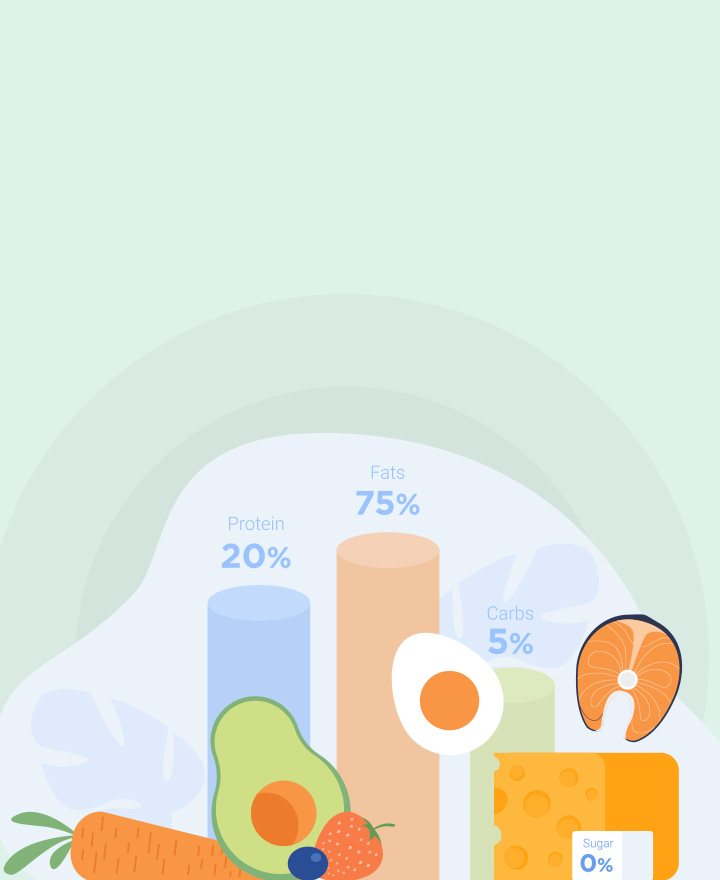

Things to know about Keto Diet
A ketogenic diet or keto diet is a diet that enables a person's body to enter into a state of ketosis. Ketosis is the state in which a body does not have enough carbohydrates to burn for energy and hence starts burning fat instead.
A keto diet plan contains low-carb and high-fat foods. In this diet, a minimum of 70% of calories come from fat, less than 10% from carbs, and less than 20% from protein. The purpose of a keto diet plan is to push your body into an alternative metabolic state resulting in fat loss and thus weight loss.
Why Does Keto Diet Work?
When consumption of carbs falls to less than 50 grams daily, the body does not have enough glucose to use for energy and hence the liver starts converting body fat into ketones, which are then used to provide energy to the body.
In the state of ketosis, ketones replace glucose as your body's primary source of fuel, thus enabling fat loss and as a result, weight loss.
Benefits of Keto Diet
1. Supports weight loss
A keto diet plan assists in weight loss in many ways, including reducing appetite and boosting metabolism. The food consumed in this diet keeps you feeling full for a longer time. thus making it easier to manage your appetite.
2. Helps control insulin levels
Studies have proven that blood sugar and insulin levels could be significantly controlled by cutting carbohydrates. Studies also show that people with diabetes who followed the keto diet, could take a 50% lower dose of insulin. Around 95% of participants in the study, reduced or even stopped taking medication to lower blood sugar levels within six months.
3. Improves good cholesterol levels (HDL) and controls bad cholesterol (LDL)
HDL levels are seen to be increased & LDL levels are reduced by following a low-carb diet, thereby lowering risk of heart disease.
4. Helps in lowering blood pressure
A low-carb diet lowers blood pressure levels, which in turn reduces the risk of many other diseases.
5. Reduces acne
In some people, acne is caused due to high insulin levels and an unhealthy diet. A diet high in refined and processed carbs, alters gut bacteria and affects digestion, also leading to significant changes in your blood sugar. So, some people find that following a keto diet acts as a stabilizer and clears their acne.
6. Decreases risk of certain types of cancers
Insulin lets your body store glucose as fuel and since you burn through this fuel quickly when your body is in ketosis, cancer cell growth slows down. Researchers have found that following a keto diet plan can be used in conjunction with other treatments for cancer.
7. Protect brain function
Some studies suggest that the ketones generated provide neuroprotective benefits such as protecting and strengthening brain cells.
A Word of Caution
Always consult a nutritionist or a medical practitioner before you make major changes to your diet and lifestyle, especially if you are obese or have other serious health conditions. Usually, most side effects of following a keto diet are minor such as constipation, indigestion, headaches or mild flu-like symptoms.
However, burning stores of fat can sometimes be hard on your kidneys. So going on a keto diet and going back to a normal diet can be tricky. Hence, medical supervision and advice is essential if you want to avoid serious adverse effects on your health.
Conclusion
Following a keto diet plan is beneficial in many ways, not the least of which is weight and fat loss. Additionally, it helps you lower LDL cholesterol levels, increase HDL cholesterol, reduce your appetite, reduce blood pressure and blood sugar levels, etc. Aketo diet plan can help you kickstart a healthy lifestyle which is sustainable over long-term.
One of the important components of our overall wellness is also being financially secured. Healthcare emergencies can happen any time, but a good health insurance policy can protect you from such uncertain situations. To know more about Wellness and other health related tips, visit the Wellness Corner.
Disclaimer: This blog provides general information and discussions about health and related subjects. The information and other content provided in this blog, website or in any linked materials are not intended and should not be considered, or used as a substitute for, medical advice, diagnosis or treatment. Kindly contact your Doctor before starting a new medicine or health regime.
Sources: WebMD, Harvard T.H. Chan
Related Articles
How To Start A Diet And Sustain It?
Tips To Control Your Cravings While Working From Home
Planning To Go On A Diet? Here Are 5 Questions To Ask First
Published on August 09, 2022

















 Health Insurance
Health Insurance  Travel Insurance
Travel Insurance  Car Insurance
Car Insurance  Cyber Insurance
Cyber Insurance  Critical Illness Insurance
Critical Illness Insurance
 Pet Insurance
Pet Insurance
 Bike/Two Wheeler Insurance
Bike/Two Wheeler Insurance  Home Insurance
Home Insurance  Third Party Vehicle Ins.
Third Party Vehicle Ins.  Tractor Insurance
Tractor Insurance  Goods Carrying Vehicle Ins.
Goods Carrying Vehicle Ins.  Passenger Carrying Vehicle Ins.
Passenger Carrying Vehicle Ins.  Compulsory Personal Accident Insurance
Compulsory Personal Accident Insurance  Travel Insurance
Travel Insurance  Rural
Rural